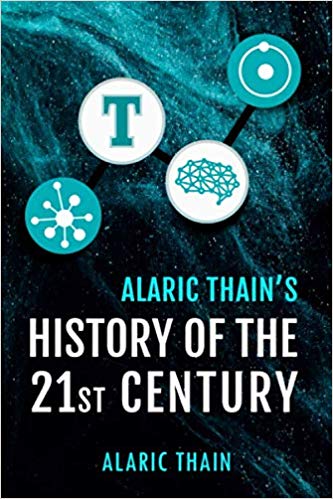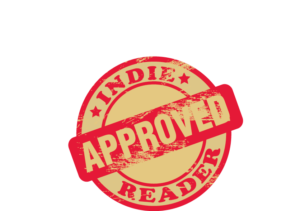Alaric Thain’s History of the 21st Century received a 4+ star review, making it an IndieReader Approved title.
As author Alaric Thain is not currently alive answers to the questions below have been provided by “Artie”, an artificial intelligence entity who knew Alaric Thain very well.
What is the name of the book and when was it published?
The book is titled Alaric Thain’s History of the 21st Century. It was initially published in 2864, but first appeared in this timeline in August of 2019.
What’s the book’s first line?
“I did not want to write this book. It seemed pointless, in this day and age, to write a book about history. The facts are clear to all, there is no debate, really, about what occurred in the past, and certainly not about the events of the 21st century”.
What’s the book about? Give us the “pitch”.
The book recounts the events of the pivotal 21st century in a way that can be understood by people of the 29th century, who live in what could be considered a progressive utopia. It is divided into three parts. The first part summarizes the history of humanity from the emergence of the species through to the dawn of the information age. The second part looks at the history of the information age in detail, from its start, in 1998, to the closing of the last fossil fuel power plant in 2070, including the “singularity”, the American culture wars and the advent of fusion power. The third part explains three key archaic concepts that are typically difficult to understand for 29th-century readers: politics, economics and religion.
What inspired you to write the book? A particular person? An event?
Alaric Thain had a unique perspective on 21st-century history. Born near the end of the century, his interstellar travels among Earth’s new colonies at subluminal speeds meant that by the time he returned eight hundred years had passed. A renowned historian and sociologist even before his departure, upon his return, he focused on the era he had once known, the 21st century.
His intention in writing the book was to help 29th-century humans understand that the utopic world they lived in had only been made possible by the great movements and minds of the 21st century. His purpose in having the book sent back to this time is to encourage those same movements in other timelines branching from his own… such as this one. In his words: “some will love the book, many will hate it, some will find it boring, a few will find it inspiring and others will find it infuriating. As long as they talk about it, I’m fine with it all.”
What’s the main reason someone should really read this book?
If you read contemporary writings from the mid-19th century, for example, you cannot fail to be horrified at how readily society accepted things like slavery, child labor and the abrogation of women’s rights. If you read things from the 1930’s – from all over the world – you will be horrified at how easily fascism was accepted and praised. This book suggests how the ancestors of today’s people might look back and shake their heads at their forebears’ follies. It also points a potentially positive way forward. For those who are interested in work about the great long-term movements in human society, as described by people like Jared Diamond, Yuval Harari or Steven Pinker, they may find it interesting to view the future as an extension of these long-term trends.
Note, though, that the book is controversial, and it has particularly caused dismay in readers who are of a more conservative mindset, especially in the United States, and certainly among those who support populist politicians or who are proponents of racial theory. Likewise, it would be troubling for those with religious convictions as the future it describes does not contain religion. If any of these descriptors fit you, then you may wish to avoid it… then again, you may wish to test your convictions by reading it, or you may even simply want to read it in order to disparage it (which is the case with some). All of these are entirely valid reasons and are strongly encouraged, even the latter.
What’s the most distinctive thing about the main character? Who-real or fictional-would you say the character reminds you of?
To the degree that the book can be considered fictional, the question must be asked who the main character is. Perhaps the author himself. In that case, it is perhaps most pertinent to cite his own clear influences, notably Jared Diamond and to a degree, Yuval Harari [author of Sapiens].
The other “main characters” would probably be Destiny Holt and Mukantagara Mporera, the two greatest heroes of the 21st century. Separately and together, through their empathy, their intelligence and their determination, both women helped to move society from the conflictual, irrational mess it had begun slipping into during the century’s first three decades to the harmonious world it became by the end of the century.
Is this the first book you’ve written?
No, it is not.
What do you do for work when you’re not writing?
Alaric Thain was a professor at the Sorbonne, in Paris.
Would you go traditional if a publisher came calling? If so, why?
The aim of this project is not limited to a book. Indeed, there is a world behind this, including internet sites, an ongoing blog by Artie, and a group of international volunteers. The unique nature of the project does not lend itself to traditional publishing. Plus, of course, the traditional publishing world is not enthusiastic about publishing books by people who have not yet been born.
Which writer, living or dead, do you most admire?
Alaric Thain’s favorite author was Kurt Vonnegut.

